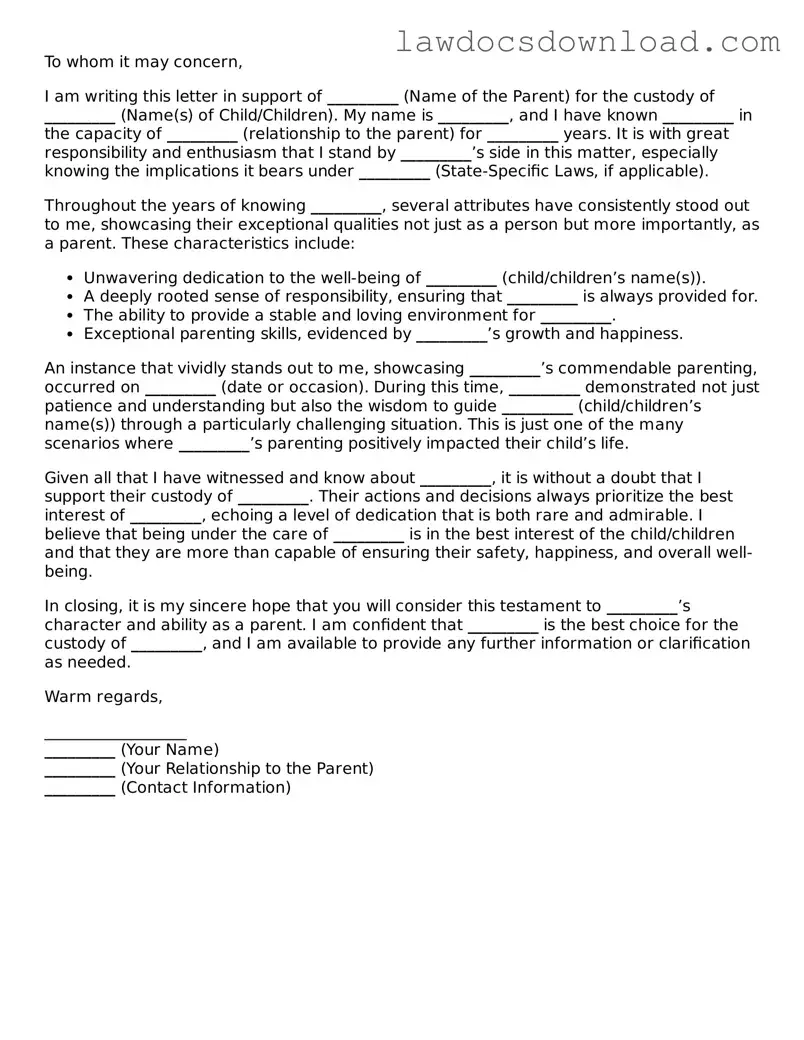A Personal Reference Letter is closely akin to a Character Reference Letter for Child Custody in its purpose and content. Like the character reference, it seeks to vouch for the moral character and personal qualities of an individual. However, it is more broadly used for various purposes, such as job applications or academic admissions, unlike the child custody letter which is specifically tailored to support claims related to a child custody case.
An Affidavit of Character operates similarly to the Character Reference Letter for Child Custody but comes with a key difference: an affidavit is a sworn statement made under oath and notarized by a legal official. This document also attests to the character of an individual, offering evidence in legal proceedings, which includes but is not limited to, child custody battles. The formal and legally binding nature of an affidavit makes it a stronger form of testimony compared to a character reference letter.
The Guardian's Consent Letter shares a connection with the Character Reference Letter for Child Custody, as both documents involve child welfare and legal guardianship matters. The Guardian's Consent Letter, however, is specifically used to grant permission for a minor child to travel with another adult who is not their legal guardian or to receive medical treatment. It demonstrates a guardian’s trust in another adult's care for the child, whereas the character reference letter advocates for an individual’s right or ability to retain or obtain custody.
Employment Reference Letters and Character Reference Letters for Child Custody are alike in that both serve as recommendations. While the former focuses on an individual’s abilities and qualifications for a particular job, the latter emphasizes the individual's moral character and parental capabilities. The employment reference might touch upon character traits relevant to the workplace, but the child custody letter specifically addresses traits that impact child-rearing.
A Petition for Guardianship document, while used in legal proceedings much like the Character Reference Letter for Child Custody, is employed to request the legal right to make decisions on behalf of another individual, typically a minor or an incapacitated adult. It's a more formal legal mechanism, contrasting with the character reference which acts as supportive evidence for why an individual should be considered suitable for custody or guardianship rather than directly requesting it.
The Letter to Withdraw from a Joint Account has similarities with the Character Reference Letter for Child Custody as both can involve family dynamics and financial considerations concerning dependents. However, the Letter to Withdraw from a Joint Account is specifically designed to navigate financial institutions’ procedures for separating joint account holders' funds, without addressing custody or character issues directly.
Declaration of Informal Marriage documents bear resemblance to Character Reference Letters for Child Custody in the sense that both can play roles in family law matters. Nonetheless, a Declaration of Informal Marriage is used to legally establish a marriage that has not been solemnized through traditional ceremonies, impacting spousal rights and obligations. In contrast, the character reference letter supports a party's suitability for child custody, not marital status.
Adoption Reference Letters, much like Character Reference Letters for Child Custody, evaluate the qualities of individuals in the context of child care and rearing. An adoption reference letter is specifically designed to assist in the adoption process by assessing the prospective parents’ ability to provide a safe and nurturing environment for a child. This is parallel to how a custody character letter supports an individual’s claim for custody, emphasizing suitability in a parental role.
The Financial Hardship Letter for Fee Waivers is employed to request the waiving of fees owing to financial difficulties and, like the Character Reference Letter for Child Custody, can be used in legal and court-related contexts. Though its primary focus is on one’s financial situation, rather than character or suitability for custody, it establishes the individuals' circumstances that might indirectly affect their legal strategies or capacities to pursue child custody.

